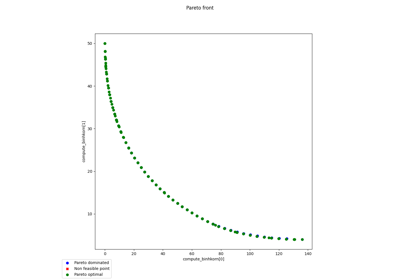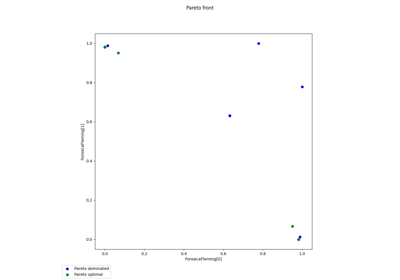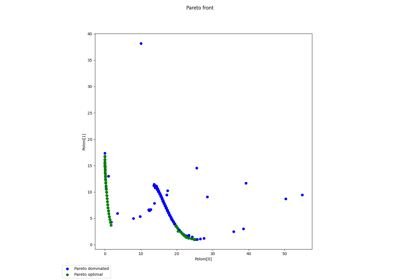opt_result_multiobj module¶
Multi-objective optimization result.
- class gemseo.algos.opt_result_multiobj.MultiObjectiveOptimizationResult(x_0=None, x_0_as_dict=<factory>, x_opt=None, x_opt_as_dict=<factory>, f_opt=None, objective_name='', status=None, optimizer_name=None, message=None, n_obj_call=None, n_grad_call=None, n_constr_call=None, is_feasible=False, optimum_index=None, constraint_values=None, constraints_grad=None, pareto_front=None, _MultiObjectiveOptimizationResult__PARETO_FRONT='pareto_front')[source]¶
Bases:
OptimizationResultThe result of a multi-objective optimization.
- Parameters:
x_0 (ndarray | None) –
x_0_as_dict (dict[str, ndarray]) –
By default it is set to <factory>.
x_opt (ndarray | None) –
x_opt_as_dict (dict[str, ndarray]) –
By default it is set to <factory>.
f_opt (ndarray | None) –
objective_name (str) –
By default it is set to “”.
status (int | None) –
optimizer_name (str | None) –
message (str | None) –
n_obj_call (int | None) –
n_grad_call (int | None) –
n_constr_call (int | None) –
is_feasible (bool) –
By default it is set to False.
optimum_index (int | None) –
constraint_values (Mapping[str, ndarray] | None) –
constraints_grad (Mapping[str, ndarray | None] | None) –
pareto_front (ParetoFront | None) –
_MultiObjectiveOptimizationResult__PARETO_FRONT (Final[str]) –
By default it is set to “pareto_front”.
- classmethod from_dict(dict_)¶
Create an optimization result from a dictionary.
- Parameters:
dict – The dictionary representation of the optimization result. The keys are the names of the optimization result fields, except for the constraint values and gradients. The value associated with the key
"constr:y"will be stored inresult.constraint_values["y"]while the value associated with the key"constr_grad:y"will be stored inresult.constraints_grad["y"].dict_ (Mapping[str, Value]) –
- Returns:
An optimization result.
- Return type:
- classmethod from_optimization_problem(problem, **fields_)¶
Create an optimization result from an optimization problem.
- Parameters:
problem (OptimizationProblem) – The optimization problem.
**fields_ – The fields of the
OptimizationResultthat cannot be deduced from the optimization problem; e.g."optimizer_name".
- Returns:
The optimization result associated with the optimization problem.
- Return type:
- to_dict()[source]¶
Convert the optimization result to a dictionary.
The keys are the names of the optimization result fields, except for the constraint values and gradients. The key
"constr:y"maps toresult.constraint_values["y"]while"constr_grad:y"maps toresult.constraints_grad["y"].- Returns:
A dictionary representation of the optimization result.
- constraint_values: Mapping[str, ndarray] | None = None¶
The values of the constraints at the optimum.
- constraints_grad: Mapping[str, ndarray | None] | None = None¶
The values of the gradients of the constraints at the optimum.
- optimum_index: int | None = None¶
The zero-based position of the optimum in the optimization history.
- pareto_front: ParetoFront | None = None¶
The Pareto front when the solution is feasible.
Examples using MultiObjectiveOptimizationResult¶

Multi-objective Binh-Korn example with the mNBI algorithm

Multi-objective Fonseca-Fleming example with the mNBI algorithm

Multi-objective Poloni example with the mNBI algorithm
